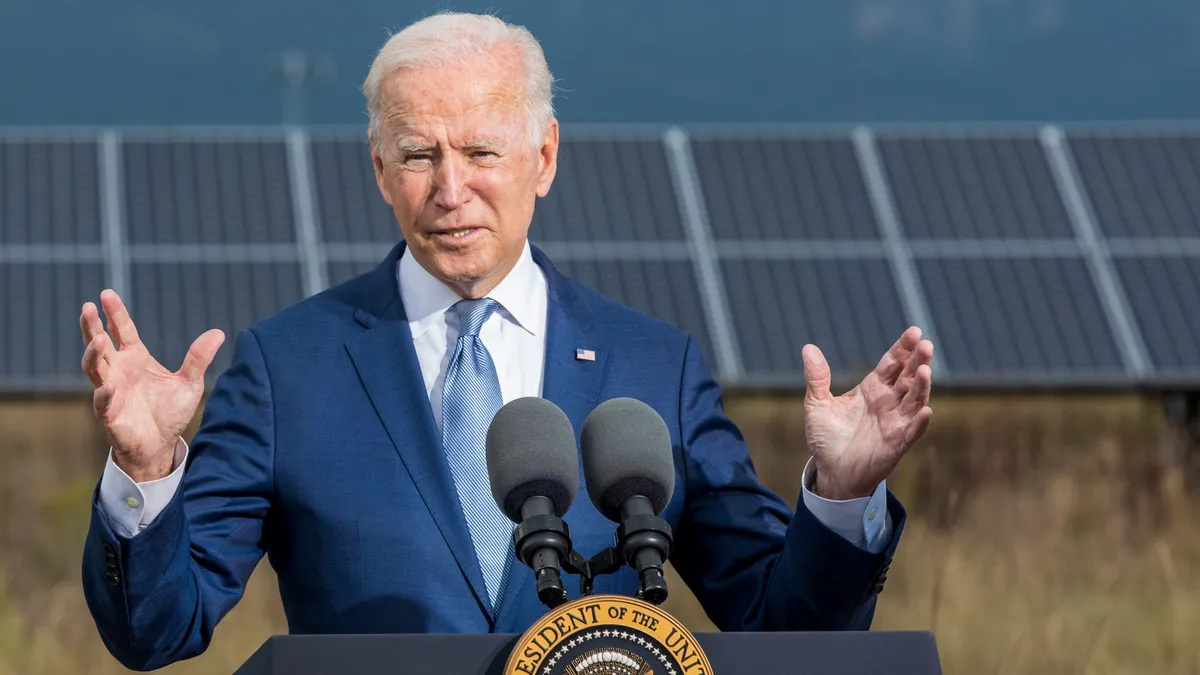Dive Brief:
-
The U.S. Department of Energy aims to build up domestic production of solar panels, electric transformers, heat pumps, insulation and hydrogen-related equipment under the Defense Production Act, or DPA, determinations issued Monday by the White House.
-
The DOE could support those sectors through commitments to buy clean energy products from U.S. manufacturers; direct investments in facilities; and aid for clean energy installations in homes, military sites and businesses, Charisma Troiano, department press secretary, said in an email.
-
The Biden administration’s move to use its executive power is a “game changer” that will establish and bolster a manufacturing base to support the renewable energy transition, according to Jean Su, energy justice program director at the Center for Biological Diversity.
Dive Insight:
The DPA, which President Joe Biden has invoked to spur COVID-19 vaccine and electric battery production, allows the White House to coordinate with industry to obtain supplies that are deemed to be in the interest of national defense, according to Su.
The White House issued similar DPA determinations for the solar, hydrogen, heat pump, insulation and grid equipment sectors.
“Ensuring a robust, resilient, and sustainable domestic industrial base to meet the requirements of the clean energy economy is essential to our national security, a resilient energy sector, and the preservation of domestic critical infrastructure,” Biden said in the findings.
The Center for Biological Diversity in February urged Biden to use his executive powers, including through the DPA, to tackle climate change.
Congress has appropriated about $888 million in DPA funding through Fiscal Year 2022 appropriations measures and a Ukraine aid package approved last month, according to Su. “It’s obviously not enough,” Su said, noting the center supports pending legislation that would provide $100 billion in DPA funding for the clean energy sector.
DOE’s Troiano said the DPA authority expands the department's ability to support domestic manufacturers of critical clean energy technologies.
“The exact tools and mechanics of the programs will vary by technology, market, and funding appropriated by Congress,” Troiano said. “DOE, working closely with the Department of Defense and others, will lean on its significant experience procuring energy products and distributing, installing, and/or selling clean energy technologies.”
DOE said it will encourage recipients of federal support to use strong labor standards, including project labor agreements and community benefits agreements that include local hire provisions. It will also encourage a focus on low-income communities.
The DOE plans to work with industry, labor and community groups as it sets up the DPA-related programs.
Expanding use of the DPA can be a useful short-term mechanism for improving America's energy independence, Advanced Energy Economy said Monday on Twitter.
“However, the DPA is not a catch-all or long-term solution. We need Congress to act. A reconciliation package that includes the right manufacturing tax credits could go a long way,” the trade group said.
Besides pausing tariffs on certain solar imports for two years, the Biden administration also plans to use the federal government’s procurement power to support the solar sector, according to the White House announcement.
Biden called for creating "master supply agreements" to speed the sale of domestically-made solar systems to the U.S. government as well as “super preferences” to apply domestic content standards for federal procurement of solar systems.
The White House said the procurement effort could support 10 GW in solar demand from the federal government, plus another 90 GW by teaming up with state and local governments and municipal utilities.
Meanwhile, the DOE will also seek to support domestic production of key grid components.
The move to use the DPA to support domestic manufacturing for grid equipment like transformers could help address supply chain disruptions that are threatening grid reliability, according to the National Rural Electric Cooperative Association.
“Shortages of transformers pose a risk to normal electric grid operations as well as recovery efforts for systems disrupted by a natural disaster,” NRECA CEO Jim Matheson said in a statement. “The Biden administration’s use of the [DPA] to shorten lead times for supplies of electric transformers is a much-needed step to support reliability and resilience, and NRECA urges inclusion of all stakeholders in the implementation process.”
Looking ahead, the Center for Biological Diversity would like Biden to use the DPA to support transportation electrification, microgrids and battery storage, according to Su.














